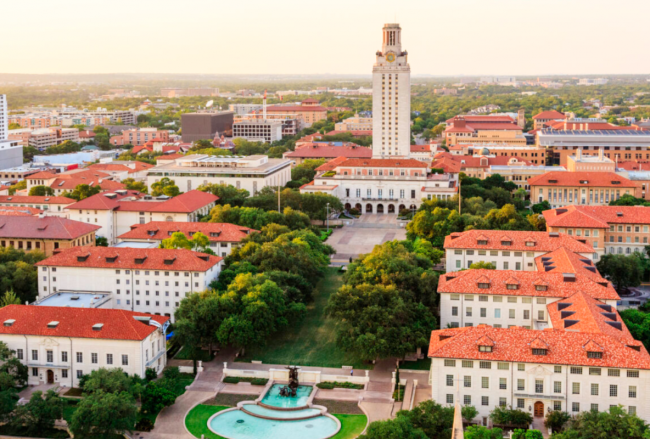You have /5 articles left.
Sign up for a free account or log in.

University of Texas at Austin
UT Austin
Faculty members at the University of Texas at Austin still have lots of questions about the Liberty Institute, a think tank apparently coming to campus. That’s even after the university provost addressed the matter at a recent Faculty Council meeting.
What more do professors want to know?
“Everything,” said Domino Renee Perez, chair of UT Austin’s Faculty Council and associate professor of English. “The faculty need to hear directly from the president, since he is the one who identified this as a priority for the university.”
Most professors first learned of the Liberty Institute idea late last month, via a Texas Tribune investigation finding that university leaders had been working with private donors and Texas Republican lieutenant governor Dan Patrick for eight months to launch it. Internal proposals describe the institute as “dedicated to the study and teaching of individual liberty, limited government, private enterprise and free markets,” according to the article.
The Tribune found that Texas legislators had already approved $6 million in initial funding for the institute in the 2022-23 state budget. The university reportedly committed another $6 million, and a private donor promised $8.5 million to a center back in 2016. No details about the project had been made public, and the university did not provide them, according to the report, which was based largely on documents obtained via open records requests.
The article names Jay Hartzell, UT Austin’s president, as being involved in the project, along with Patrick and Kevin Eltife, a Republican former state senator who was appointed to a second term to the University System of Texas’s Board of Regents this year by Republican governor Greg Abbott. Donors Bud Brigham and Bob Rowling, both conservatives, are also involved, per the report.
Following the Tribune report, faculty members have sought more information about the project and expressed concerns that the Legislature is earmarking money for an academic endeavor that few, if any, professors seem to know anything about.
Members of the council, for instance, submitted a list of eight questions to the university, including whether the Tribune’s account is accurate and how the institute will uphold intellectual freedom and faculty governance. What will the institute offer that is not already available or possible within existing programs in law, government, business and public affairs, the council also asked. How exactly is the institute funded, and are any strings attached?
What role will the faculty play, including in faculty recruitment? And how will the center be structured?
Provost Sharon Wood attempted to answer some of these questions at the council meeting earlier this week. Yet Wood, who became provost in July, said she didn’t have answers to some of their questions because discussions about the institute predated her arrival in the president’s office.
“The goal is to provide students who cross traditional boundaries and consider problems from multiple points of view,” Wood said. The institute will help students “understand how regulatory and legal environments are going to impact markets. They also will have the analytical and quantitative skills to solve complex problems and understand more economic drivers.”
Regarding the Tribune’s report, Wood said it “ignored the role of faculty governance and faculty hiring and also developing new degree programs and implied there was no interest among students.” But she did not share a clear plan for faculty governance or the faculty role in hiring.
Jeffrey Abramson, professor of government and law, said after the meeting, “The normal thing for a self-respecting university to have done, once it raised the money for the institute, would have been to go to the regular faculty and empower them, in the exercise of academic freedom, to make the hiring and curricular decisions.” Abramson said the possibility that the institute could “stand outside of the normal ways mature universities make academic decisions is a threat to the integrity of UT and gives far too much power to private donors over who teaches what to our students.”
Centers dedicated to the study of free enterprise, individual freedom and limited government exist elsewhere. Many are funded by the Charles Koch Foundation and are seen by their supporters as a counterpoint to the less conservative systems and approaches students encounter in the classroom. The BB&T bank foundation also used to offer Moral Foundations grants to colleges and universities, stipulating that they offer classes on or provide students a copy of Ayn Rand’s pro-free market novel Atlas Shrugged. In some cases, these grants came with stipulations about faculty hires. A 2011 Western Carolina University advertisement, for instance, said applicants for its BB&T Distinguished Professor of Capitalism should be “at least familiar with, if not actively receptive to, the writings of Ayn Rand.” Also in 2011, it was revealed that in cases at more than one university, Koch grant agreements stipulated that the foundation have a say in faculty hiring. A third institution, George Mason University, said in 2018 that some of its earlier agreements with Koch involved donor influence in faculty hiring.
Koch has since said that it always valued academic freedom, and that it has purposely moved away from agreement language of this nature. It’s also released a template for current donor agreements. BB&T has also ended its Ayn Rand-based program to concentrate on financial literacy-based philanthropy.
Faculty concerns about these centers remain, beyond the issue of donor influence in faculty hiring. Academic freedom advocates worry, for instance, that the underfunding of higher education makes public institutions, in particular, at risk for compromising on faculty rights to secure private funding. The state of Texas appears committed to funding this particular project, but that raises eyebrows, as well, given that politicians may know more about it than professors.
Another concern is that these institutes may be used to promote political ideas as academic research. Immunologists at Stanford University, for instance, worried about this with respect to Scott Atlas, a fellow at Stanford University’s Hoover Institution, when he was challenging the effectiveness of wearing masks as the Trump White House’s coronavirus adviser. Atlas wasn’t working directly for Hoover in this role, but his academic credentials, including his medical degree, were often cited regarding his public comments.
Elsewhere faculty members have rejected proposed centers on the grounds that they would compete with existing academic departments, namely economics.
The Hoover Institution is reportedly one model for the UT Austin institute. Wood also said at the council meeting that Tom Gilligan, former dean of the McCombs School of Business at UT Austin, had been helping plan the Liberty Institute before he left for the Hoover Institute, in 2015. Gilligan, who is now a fellow emeritus at Hoover, did not respond a request through Hoover Thursday.
Abramson said that in the “current political climate, Americans are divided, and rightly argue about the proper balance to strike between individual liberty and the public good.” But he said his fear is that the Liberty Institute, “while promising to bring diversity of thought to campus, will in fact be stacked in its hiring and course decisions to favor only one side of this essential debate.”
Not all professors are so skeptical of the Liberty Institute, as they understand it thus far, however. Richard Lowery, an associate professor of finance, said during the council meeting that he was confused by some of the criticism, as the university already funds various programs that are "explicitly political," including social justice and diversity, equity and inclusion efforts.
Lowery declined an interview request but provided the following written statement:
The University of Texas at Austin administration, with the enthusiastic support of the faculty, has implemented a diversity, equity and inclusion plan, the original version of which was described by the Foundation [for] Individual Rights in Education as follows: “[T]he proposal’s mandates present a serious threat of establishing a viewpoint based litmus test for both hiring and promotion,” with the final version being, in my opinion, as bad or worse than the original draft. Thus, not only are the supposed concerns about a political test in a potential “Liberty Institute” hypocritical, but in light of this explicit, and many implicit, political tests being used at the university, it is absolutely essential to establish some structure at UT-Austin where academic freedom can be restored. While I support the principle of establishing such a structure, the Provost’s plan is clearly designed to give control over such a unit to the existing faculty, who generally oppose academic freedom, and thus would serve as little more than a fig leaf.”
Daniel Brinks, chair of government, said he knew little about the institute but that he’d heard it could involve a cluster hire of faculty members who research areas including collective decision making, government regulation and its effects on economic and other outcomes, market design and social welfare, and drivers of social prosperity.
Speaking only for himself, he said, “I imagine that whether our department would support a hire within this cluster would depend on how the scope of the cluster is defined, and how well it lines up with our priorities and disciplinary standards.” And as with “any hire,” he said, “I’m sure we would all expect that our normal governance processes will be respected, including our normal role in selecting the faculty we hire.”
J. B. Bird, spokesperson for the university, said he was conferring with the provost’s office on a request for comment or an interview. Late in the day, he shared a link to a new bullet point-style information page on the institute. Bird highlighted the following point: “Any new professors will be hired within normal university protocols, which include deans and department chairs." He distinguished new professors from current professors who become affiliated with the institute. As for academics, the page says, “we plan to do an inventory of existing courses to develop a list of new classes that may be added.”
Bird added that the institute is “still in a planning phase.”









